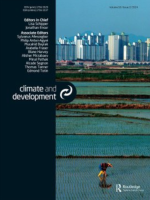"These days, things have changed”
Alarmist scenarios about climate change and migration depict millions of Africans entering northern countries, pushed by irreversible environmental damage. As much research has shown, this is a simplified and exaggerated picture, as most African migrants move short distances, to urban centers or perhaps neighbouring countries in response to climate change or other livelihood and security challenges. Moreover, we know that migration has been part of life in Africa for centuries, also in response to environmental conditions, rather than constituting a new phenomenon. What we do not know much about, however, is the history of climate-change related migration.
In a new article in Climate and Development, a team of Ghanaian and DIIS researchers take this head on in an historical analysis of internal migration from the dry north to more fertile and economically developed urban centers in the southern part of Ghana. Drawing on historical documents, meteorological data, a household survey, and interviews and focus group discussions with farmers, the paper demonstrates that migration and mobility are rooted in historical patterns established and reinforced through colonial and post-colonial governance. These patterns reflect inequalities created by past and present development policies as well as environmental factors.
Furthermore, while environmental change does intensify existing migration patterns, it is difficult to isolate these effects from the economic, social, and political factors which also contribute to migratory movements. The paper therefore concludes that migration is co-constituted by past and present governance practices, disparities, development policies, and social transformation as well as environmental factors. Analysis and policy narratives that attribute recent migration movements to climate change only are simplistic and blur the effects of past and present structural inequalities and political engagement.
The paper is part of the Governing Climate Mobility (GCM) collaborative research project between DIIS and research partners in Ghana and Ethiopia. It is funded by the Danish Consultative Research Committee (FFU).
The following researchers contributed to the article:
- Joseph Kofi Teye, Director of Research at the Office of Research, Innovation and Development at the University of Ghana.
- Francis Jarawura, senior lecturer in the Department of Planning at the SD. Dombo University in northern Ghana.
- Nauja Kleist, senior researcher, DIIS
- Lily Salloum Lindegaard, senior researcher, DIIS
- David Quaye, Senior meteorologist, Ghana Meteorological Agency
- Natural resources and environment
- Water governance
- Food and agriculture
- Land rights and investments
- Climate change and environment
- Migration
- High-risk migration
- Migration and development
- Migration and border management
- Development policy
- Inequality and poverty
- Development in practice
- History and foreign policy
- World politics
DIIS Experts



